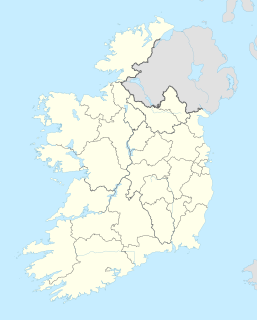
Connacht, or Connaught, is one of the provinces of Ireland, in the west of Ireland. Until the ninth century it consisted of several independent major Gaelic kingdoms.

Roscommon is the county town and the largest town in County Roscommon in Ireland. It is roughly in the centre of Ireland, near the meeting of the N60, N61 and N63 roads.

Claddagh is an area close to the centre of Galway city, where the River Corrib meets Galway Bay. It was formerly a fishing village, just outside the old city walls. It is just across the river from the Spanish Arch, which was the location of regular fish markets where the locals supplied the city with seafood as recently as the end of the 19th century. People have been gathering seafood and fishing from the area for millennia. It is one of the oldest former fishing villages in Ireland - its existence having been recorded since the arrival of Christianity in the 5th century.

Athenry is a town in County Galway, Ireland, which lies 25 kilometres (16 mi) east of Galway city. Some of the attractions of the medieval town are its town wall, Athenry Castle, its priory and its 13th century Anglo-Norman street-plan. The town is also well known by virtue of the song "The Fields of Athenry".

The Tribes of Galway were 14 merchant families who dominated the political, commercial and social life of the city of Galway in western Ireland between the mid-13th and late 19th centuries. They were the families of Athy, Blake, Bodkin, Browne, Darcy, Deane, Font, French, Joyce, Kirwan, Lynch, Martyn, Morris and Skerritt. Of the 14 families, 12 were of Anglo Norman origin, while two — the Darcy and Kirwan families — were Normanised Irish Gaels.

Richard Luke Concanen, O.P., was an Irish prelate of the Roman Catholic Church, who served as the first bishop of the Diocese of New York (1808–1810).

The Dominican Order has been present in Ireland since 1224 when the first foundation was established in Dublin. This was quickly followed by Drogheda, Kilkenny (1225), Waterford (1226), Limerick (1227) and Cork (1229). The order was reestablished in the 19th century after having been driven out in the 17th century by laws against Catholic religious orders. During the penal laws, Irish Dominicans established colleges in Lisbon and Louvain (1624-1797) to train clergy for ministering in Ireland.
Folan, is an Irish family name. They were a Brehon family in County Galway. The Folan family are of Conmhaícne origin.
Events from the year 1820 in Ireland.
John O'Heyne was an Irish Dominican and historian.
Nicholas Blake was a member of the Dominican Order.
Thomas D Folan, 1810 - 1874, Mayor/King of the Claddagh.
Christopher French was an Irish theologian.
Peter French was an Irish theologian.
Peter Martin (STP) was an Irish preacher and Master of Sacred Theology, who died 1645.
Dominic de Burgo (1629-1704) was Bishop of Elphin.
Colman O'Shaughnessy, O.P. was an Irish Roman Catholic clergyman who served as Bishop of Ossory from 1736 until his death in 1748.
Denis Daly, was an Irish landowner, Judge and Privy Councillor.
Nicholas Lynch, Dominican priest and prior of Galway.
Events from the year 1484 in Ireland.





